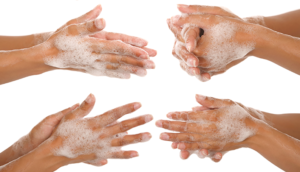 The most important viruses that cause foodborne disease are Hepatitis A, Norovirus and Rotavirus
The most important viruses that cause foodborne disease are Hepatitis A, Norovirus and Rotavirus
Viruses are different to bacteria. Unlike bacteria that can grow on foods under various conditions, viruses do not grow in food. They rely on other cells such as those of humans, animals and plants, to be able to multiply. Viruses do this by invading specific host cells, taking over the cell’s machinery forcing it to make new virus particles then rupturing the cell to release lots of new viruses. Only a few virus particles are believed to be required to cause infections.
During the cooler weather in the southern parts of Australia viral infections such as Norovirus and Rotavirus can become more common. Regular handwashing is one of the best ways to stop these viruses spreading. If you don’t have access to handwashing facilities then alcohol sanitiser is also a good option but make sure you cover all surfaces of both hands before it dries.
Always wash your hands and dry thoroughly after going to the toilet or blowing your nose as well as before handling, preparing or eating food. Here are three tips on how to wash your hands correctly:
- Wet your hands and rub together well to build up a good lather with soap as the suds help to loosen the bugs. Do this for at least 20 seconds and don’t forget to wash between your fingers and under your nails.
- Rinse well under running water to wash away the bugs from your hands
- Dry your hands thoroughly on a clean towel for at least 20 seconds – a hand dryer may take a little longer.
